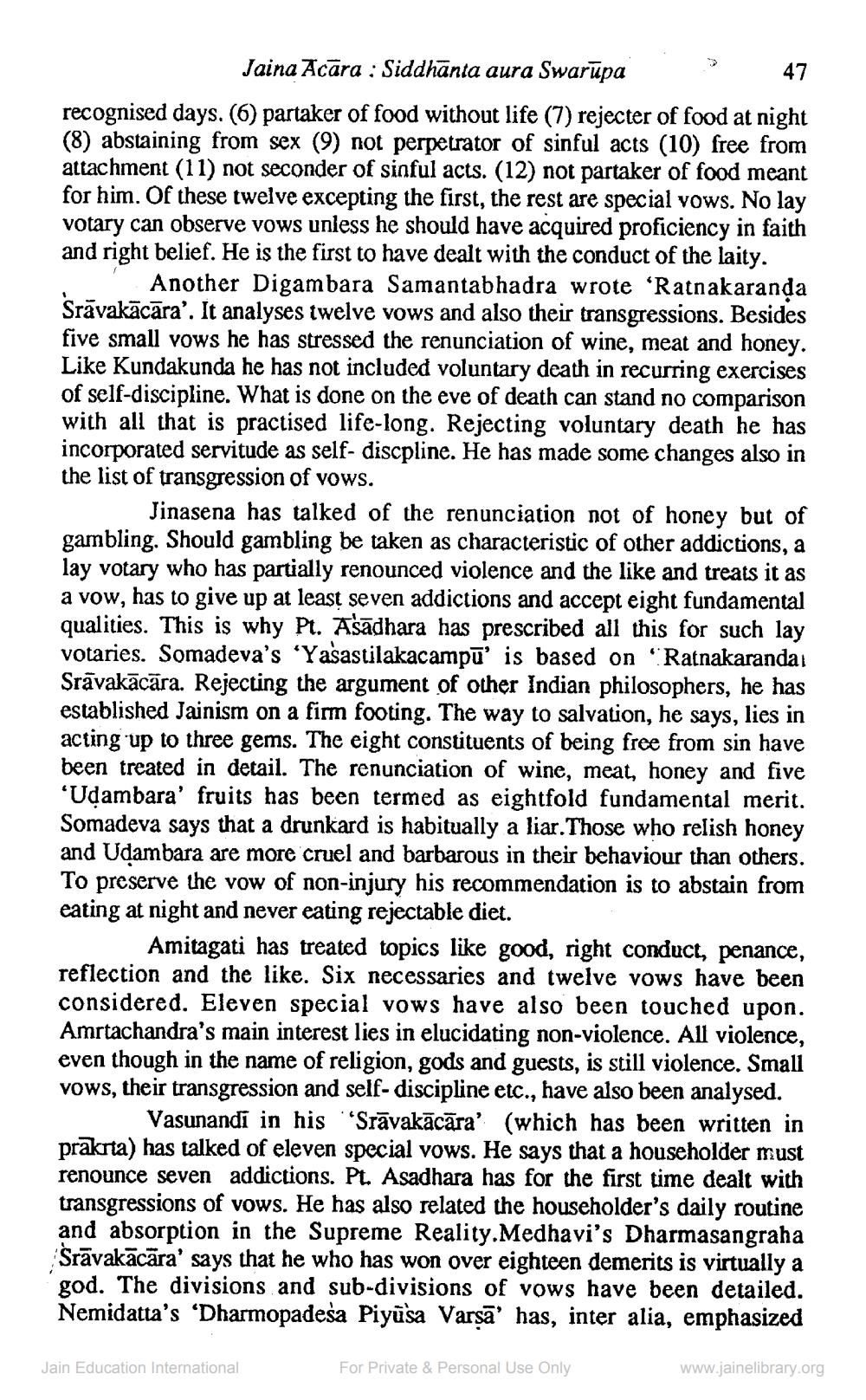________________
Jaina Acāra : Siddhanta aura Swarūpa
47
recognised days. (6) partaker of food without life (7) rejecter of food at night (8) abstaining from sex (9) not perpetrator of sinful acts (10) free from attachment (11) not seconder of sinful acts. (12) not partaker of food meant for him. Of these twelve excepting the first, the rest are special vows. No lay votary can observe vows unless he should have acquired proficiency in faith and right belief. He is the first to have dealt with the conduct of the laity.
Another Digambara Samantabhadra wrote 'Ratnakaranda Srāvakācāra'. It analyses twelve vows and also their transgressions. Besides five small vows he has stressed the renunciation of wine, meat and honey. Like Kundakunda he has not included voluntary death in recurring exercises of self-discipline. What is done on the eve of death can stand no comparison with all that is practised life-long. Rejecting voluntary death he has incorporated servitude as self-discpline. He has made some changes also in the list of transgression of vows.
Jinasena has talked of the renunciation not of honey but of gambling. Should gambling be taken as characteristic of other addictions, a lay votary who has partially renounced violence and the like and treats it as a vow, has to give up at least seven addictions and accept eight fundamental qualities. This is why Pt. Asadhara has prescribed all this for such lay votaries. Somadeva's 'Yasastilakacampū' is based on Ratnakarandai Srāvakācāra. Rejecting the argument of other Indian philosophers, he has established Jainism on a firm footing. The way to salvation, he says, lies in acting up to three gems. The eight constituents of being free from sin have been treated in detail. The renunciation of wine, meat, honey and five 'Udambara' fruits has been termed as eightfold fundamental merit. Somadeva says that a drunkard is habitually a liar. Those who relish honey and Udambara are more cruel and barbarous in their behaviour than others. To preserve the vow of non-injury his recommendation is to abstain from eating at night and never eating rejectable diet.
Amitagati has treated topics like good, right conduct, penance, reflection and the like. Six necessaries and twelve vows have been considered. Eleven special vows have also been touched upon. Amrtachandra's main interest lies in elucidating non-violence. All violence, even though in the name of religion, gods and guests, is still violence. Small vows, their transgression and self-discipline etc., have also been analysed.
Vasunandi in his "Srāvakācāra' (which has been written in prakrta) has talked of eleven special vows. He says that a householder must renounce seven addictions. Pt. Asadhara has for the first time dealt with transgressions of vows. He has also related the householder's daily routine and absorption in the Supreme Reality.Medhavi's Dharmasangraha Srāvakācāra' says that he who has won over eighteen demerits is virtually a god. The divisions and sub-divisions of vows have been detailed. Nemidatta's 'Dharmopadesa Piyūsa Varsā' has, inter alia, emphasized
Jain Education International
For Private & Personal Use Only
www.jainelibrary.org




